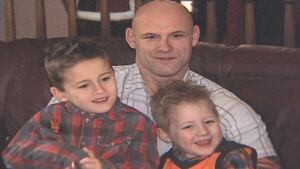At the end of July, 38-year-old Edmonton firefighter Brad Symes took his life, leaving behind his wife of seven months, two young boys, loving parents and countless friends — and his family is linking his death to post-traumatic stress disorder (PTSD).
Symes was a firefighter for 13 years, following in his father's footsteps.
Stan Symes retired as the district fire chief in Edmonton after 35 years on the job. While he worked as a first responder, he found it helpful to confide in his wife, Char.
Brad Symes often called his parents to talk about his job and the things he witnessed.
"Lots of times he would just call and say, 'Mom, this is what happened today,'" Char said. "He has two little children and that's hard for any parent. You think of your own kids, and you want to hug them more and love them more."
But Stan Symes remembers one phone call in particular.
"He went to a call at O'Leary Pool and a little guy had drowned," Stan said. "He was upset. He related it to his boys. It's just, you have to talk about it."
The Symes believe that traumatic incident may have been a turning point in their son's life.
Brad Symes was never officially diagnosed with PTSD. His parents said there were no overt signs of his mental-health issues. His family has now filed a claim for workers' compensation, but will have to prove he suffered from the disorder.
PTSD legislation
The suicide of the veteran firefighter has again raised the issue of PTSD among first responders.

Edmonton firefighter Brad Symes left behind two children, a wife, parents and close friends when he committed suicide. His family is linking his death to post-traumatic stress disorder. (CBC News)
Alberta passed legislation in late 2012 that says first responders diagnosed with PTSD do not have to prove if the illness was job-related in order to get workers' compensation.
Since the legislation was enacted, 36 claims have been filed — 17 by paramedics, 11 by firefighters and eight by police officers. Thirty-two of those claims have been accepted.

Stan and Char Symes were shocked by their son Brad's suicide. They hope telling his story will raise awareness about post-traumatic stress disorder among first responders. (CBC News)
Vince Savoia, founder of the organization Heroes are Human, said he's surprised the number of people filing claims is so low.
"I need to wonder if many of the first responders are fearful of coming forward," he said.
Savoia calls it the "John Wayne" syndrome — those who help people won't ask for help when they need it themselves.
"It's seen as a sign of weakness, when in fact it should be seen as a sign of strength."
Stan Symes admits that was often the mentality while he was a firefighter.
"You could never show a weakness," he said. "We were the ones that were coming to you and you just had to show that front. It hurt a lot of people because of that."
While he was district fire chief, he said he asked his firefighters to talk to each other whenever they felt stressed.
"We have to figure out ways on how to deal with it," Stan Symes said. "I know that if it's happened to our son, Char and I are going to be right at the front, trying to fight against this illness."
Removing the stigma
Edmonton firefighters were shocked to learn of the death of their caring co-worker.
Greg Holubowich, president of the union representing firefighters, said Brad's suicide has had an incredible impact on his members.
"What could we have done differently? How could we have helped Brad in this obviously dark time in his life?" he said. "I think we can gather strength by taking this tragedy, this negative, and ensure we have open lines of communication in the future."
Edmonton fire Chief Ken Block said he wants to ensure that first responders facing mental-health issues seek help.
"We need to really commit ourselves to what's happened in Brad's situation and not allow it to pass and be forgotten," Block said.
"In many ways, that's part of our challenge moving forward, changing the perception and that stigma that may go along with mental-health challenges that all of us experience from time to time."
'How many more?'
Char Symes describes her son as "an honest, good-hearted, loving dad."
Hundreds of first responders attended Brad's funeral, which Block said was the largest one for a firefighter that he had ever seen.
"I think he had a really good life to touch so many people, and to have so many friends and be able to do so many things in his lifetime," Char Symes said.
Savoia's organization says 15 Canadian first responders have committed suicide in the past few months.
"Our son was No. 16," said Char. "How many more do we really want this to happen to?"
"We don't want to see or hear about No. 17," said Stan Symes. "We want it to stop."
Anda sedang membaca artikel tentang
Firefighter's family links suicide to PTSD, files for workers' compensation
Dengan url
http://topstorinfo.blogspot.com/2014/08/firefighters-family-links-suicide-to.html
Anda boleh menyebar luaskannya atau mengcopy paste-nya
Firefighter's family links suicide to PTSD, files for workers' compensation
namun jangan lupa untuk meletakkan link
Firefighter's family links suicide to PTSD, files for workers' compensation
sebagai sumbernya
0 komentar:
Posting Komentar